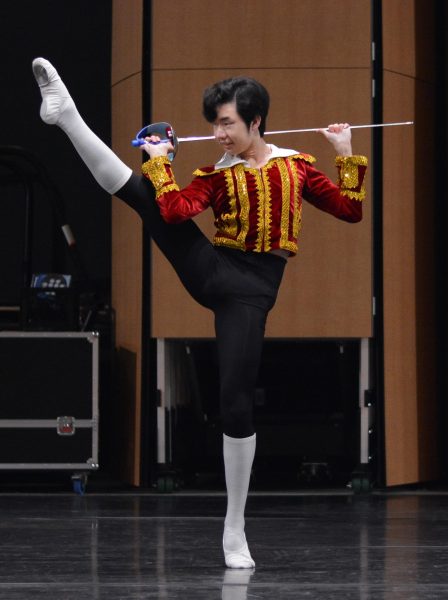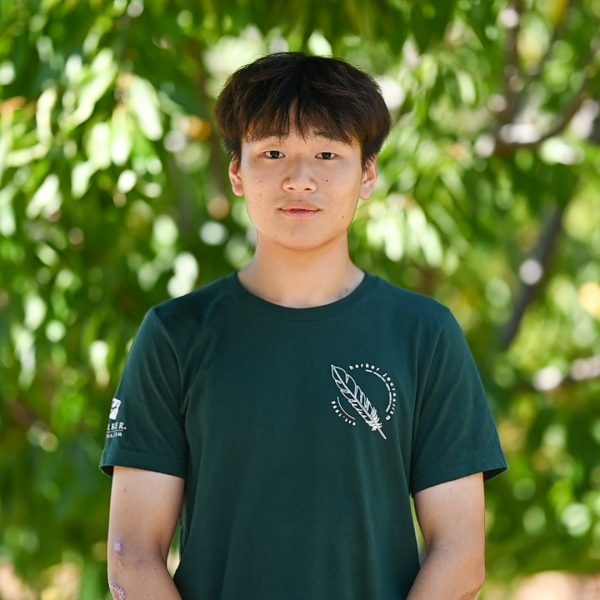
“En garde? Pret. Allez!”
With the commands having barely left the referee’s mouth, the fencers initiate their attacks, aiming to score first. With less than a full second to react, senior Anwen Hao must swiftly decide and execute the right counterattack against his opponent. As the incoming saber thrusts toward his mask, Anwen parries with an upward sweep, deflecting his opponent’s blade, landing his riposte in a single, continuous action.
“Halt! Attack from my left; touch to my left. 1 – 0.”
As Anwen walks back to the start lines, he formulates his plan for his next touch: he knows that at his level simple action would never work again. Perhaps he should attempt a direct attack. Perhaps he should wait for the perfect counterattack opportunity.
“Fencing is like chess, but you add the physical athleticism element to it,” Anwen said. “It’s that combination between physicality and mental work. I have to guess my opponent’s strategy and carry out my own strategy. Fencing is a point-by-point sport, and amidst all the pressure of winning, I have to calm down and focus on the next touch without thinking about the overall score.”
Since he began fencing at nine years old, Anwen admired the elegance in using his footwork and his saber to express ideas — his contrast of speed and patience reflects different tactics. Regardless of the situation on the fencing strip, he has already prepared an effective measure to stay in control. Close friend senior Andrew Liang befriended Anwen in middle school, and he values Anwen’s friendship through high school. He highlights Anwen’s outgoing yet calculated nature in his lifestyle.
“He’s always confident and energizing, and I never get the impression that he’s shy,” Andrew said. “He fences, so confidence is important to him because he has to be aware of how he seems to his opponent. He never lets you know he might be upset; he never looks unhappy.”
Masterfully able to control all parts of his body, Anwen also pursues ballet, performing in tragedies and comedies alike. While the saber arms him in his expression on the fencing strip, his limbs convey all the emotion on stage. The agility and deliberation in Anwen’s fencing parallels his care of intricacies and minute details that are necessary in ballet.
“I gravitated to ballet because the harmony between the music and the movement provided the most seamless channel for me to express my emotions,” Anwen said. “I have to think about how to communicate the characters to move the audience. That’s what any performing art is about: it is to give the audience an emotional and intellectual experience.”
Grasping the audience’s attention requires Anwen to become engrossed with the thoughts, feelings and actions of the characters he portrays — he fully embodies his role, and this internalization allows Anwen to successfully transform his imagination to a poignant physical expression.
In Giselle, Anwen’s favorite performance, he plays the nobleman Albrecht who falls in love with a peasant girl, but inadvertently causes her suicide. Despite the play’s tragic nature, performing in it compelled Anwen to discover new ways of portraying a spectrum of emotions through his choreography.
“Playing Albrecht was more difficult than other shows because it’s so tragic that I didn’t even know if there’s a time in my entire life where I experienced what he felt,” Anwen said. “I had to immerse myself, try to imagine myself in his time, face the same decisions and amplify the feelings of sadness that I had in my life. Through ballet, I’ve gotten a chance to experience lives that I haven’t lived before.”
Having performed in a variety of ballets, from cheery holiday specials to sorrowful tragedies, Anwen has learned to live new perspectives through the art. Trained to command himself in both physical and emotional expression, Anwen exhibits his palette of behavioral complexities in daily life. Senior Harriss Miller commended Anwen’s deliberate clothing choices as evidence of his care of his presentation.
“He wears trench coats every day, and then he wears four different layers underneath,” Harriss said. “He’s a man of many talents and characteristics. He’s got a lot going on, so you have to peel back the layers to see what’s really going on with him.”
Off the strip and off the stage, teachers notice Anwen’s poise and polished nature both in class discussions and in the hallways. Mathematics Department Chair Anthony Silk emphasized his calmness and resonated with him through performing arts.
“He certainly presents himself extraordinarily well, so to find out that he is a dancer is not a surprise,” Silk said. “There’s this grace to him in the way he moves, the way he acts and the way he speaks. He is just thoughtful, polite, respectful and graceful. There is an ease to the way he thinks about things and presents himself in everything”
In both fencing and ballet, Anwen pushes himself to experience and learn from every opportunity, regardless of difficulty or pain. On the fencing strip, he does not falter until the bout is over, and on the stage, not until the curtains close. Through every performance and every competition, Anwen propels himself to new heights.
“I’m not afraid of stepping outside of my comfort zone and doing unexpected things,” Anwen said. “I’ve realized that pain is an instinct, and I have to train my mind to tell myself that the pain is actually not harmful and to just ignore it for a moment. For me, what can look like a barrier in life can actually be an invitation for me to improve.”


















![“[Building nerf blasters] became this outlet of creativity for me that hasn't been matched by anything else. The process [of] making a build complete to your desire is such a painstakingly difficult process, but I've had to learn from [the skills needed from] soldering to proper painting. There's so many different options for everything, if you think about it, it exists. The best part is [that] if it doesn't exist, you can build it yourself," Ishaan Parate said.](https://harkeraquila.com/wp-content/uploads/2022/08/DSC_8149-900x604.jpg)




![“When I came into high school, I was ready to be a follower. But DECA was a game changer for me. It helped me overcome my fear of public speaking, and it's played such a major role in who I've become today. To be able to successfully lead a chapter of 150 students, an officer team and be one of the upperclassmen I once really admired is something I'm [really] proud of,” Anvitha Tummala ('21) said.](https://harkeraquila.com/wp-content/uploads/2021/07/Screen-Shot-2021-07-25-at-9.50.05-AM-900x594.png)







![“I think getting up in the morning and having a sense of purpose [is exciting]. I think without a certain amount of drive, life is kind of obsolete and mundane, and I think having that every single day is what makes each day unique and kind of makes life exciting,” Neymika Jain (12) said.](https://harkeraquila.com/wp-content/uploads/2017/06/Screen-Shot-2017-06-03-at-4.54.16-PM.png)








![“My slogan is ‘slow feet, don’t eat, and I’m hungry.’ You need to run fast to get where you are–you aren't going to get those championships if you aren't fast,” Angel Cervantes (12) said. “I want to do well in school on my tests and in track and win championships for my team. I live by that, [and] I can do that anywhere: in the classroom or on the field.”](https://harkeraquila.com/wp-content/uploads/2018/06/DSC5146-900x601.jpg)
![“[Volleyball has] taught me how to fall correctly, and another thing it taught is that you don’t have to be the best at something to be good at it. If you just hit the ball in a smart way, then it still scores points and you’re good at it. You could be a background player and still make a much bigger impact on the team than you would think,” Anya Gert (’20) said.](https://harkeraquila.com/wp-content/uploads/2020/06/AnnaGert_JinTuan_HoHPhotoEdited-600x900.jpeg)

![“I'm not nearly there yet, but [my confidence has] definitely been getting better since I was pretty shy and timid coming into Harker my freshman year. I know that there's a lot of people that are really confident in what they do, and I really admire them. Everyone's so driven and that has really pushed me to kind of try to find my own place in high school and be more confident,” Alyssa Huang (’20) said.](https://harkeraquila.com/wp-content/uploads/2020/06/AlyssaHuang_EmilyChen_HoHPhoto-900x749.jpeg)



